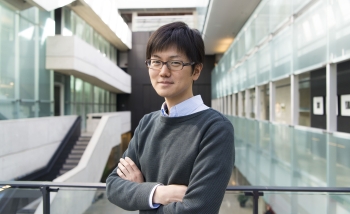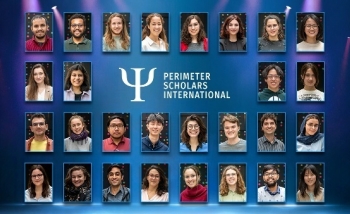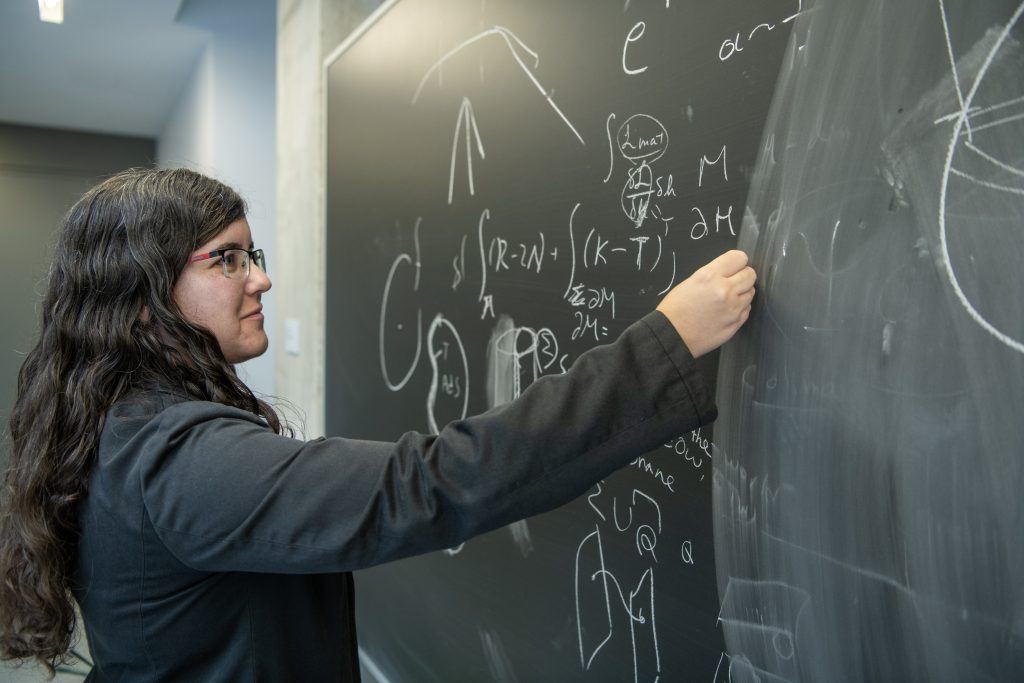Ángela Capel Cuevas adore se plonger dans ses recherches. « C’est vraiment agréable de s’asseoir et de commencer à faire des calculs à 14 heures et de terminer à 19 heures », dit-elle. « Je lève les yeux, il fait noir et j’ai fait quelque chose de tout à fait nouveau. »
Capel a définitivement (comme le disent les enfants) compris la mission. Elle a récemment passé quelques mois à l’Institut Périmètre en tant que l’une des boursières Simons Emmy Noether de l’Institut : des scientifiques en début ou en milieu de carrière qui mettent de côté leurs tâches d’enseignement et d’administration pendant un an au maximum pour se rendre à l’Institut Périmètre afin de se concentrer sur des recherches intensives. Le programme de bourses Simons Emmy Noether vise à approfondir et à élargir les programmes de recherche des boursières et à encourager les femmes en physique à une étape critique de leur carrière.
Capel avait déjà un œil sur l’Institut Périmètre lorsqu’elle a postulé pour la bourse. Lorsqu’elle a terminé son premier poste postdoctoral à l’Université technique de Munich en 2021, elle a envisagé de venir ensuite à l’Institut.
« J’avais quelques amis qui faisaient des postdoctorats à l’Institut Périmètre, et ils m’ont dit que c’était un endroit formidable », se souvient-elle. Au lieu de cela, elle a accepté un poste de professeur junior à l’Université de Tübingen en Allemagne.
L’obtention d’un un poste de professeur après un seul postdoctorat est souvent la marque d’une excellence inhabituelle et d’une grande chance. La transition n’est pas toujours facile. Alors qu’elle passait environ 90 % de son temps à faire de la recherche, Mme Capel s’est efforcée d’y consacrer 30 à 40 % de son temps. Son expérience en tant que boursière Simons Emmy Noether lui a permis d’inverser ce ratio.
Capel étudie la décohérence des systèmes quantiques, c’est-à-dire la façon dont les propriétés quantiques comme la superposition et l’intrication semblent disparaître comme des signaux radio se dissipant en statique. Comprendre (et retarder) cette dissipation est essentiel pour les chercheurs qui tentent d’utiliser les effets quantiques pour alimenter les technologies émergentes.
« Essentiellement, vous avez un système qui est initialement quantique et qui, après un certain temps, en en décohérence. J’étudie la vitesse à laquelle cette décohérence se produit », explique-t-elle.
« Comprendre les mathématiques qui sous-tendent l’évolution de tels systèmes est essentiel à la conception d’ordinateurs quantiques. Par exemple, si nous modélisons un système que les gens veulent utiliser comme mémoire quantique et qu’il entre en décohérence trop vite, la mémoire devient alors complètement inutile après un court laps de temps. »
Son travail est fondamentalement multidisciplinaire. Capel se décrit comme cherchant souvent des liens juste en dehors de ses principaux domaines de recherche.
« Je ne lis pas seulement des articles qui sont en lien direct avec ce que je fais », dit-elle. « Je lis quelque chose de nouveau, ou je vois des gens donner des conférences ou autre. Il est naturel de commencer à discuter avec ces chercheurs et de leur dire : « Je suis intéressée par cet article que vous avez publié. Je fais habituellement ce genre de choses. Pensez-vous qu’il y a quelque chose qui pourrait apparaître dans cette interaction? »
Cette approche de recherche s’intègre bien à l’Institut Périmètre.
« J’ai donné un séminaire, quelque chose de très important ici », explique Capel. « De nombreuses personnes sont venues au séminaire pour poser différentes questions. Et c’est vraiment bien, car les gens ici sont très intelligents. Ils ont de bonnes idées. Ils assistent à votre exposé et essaient immédiatement d’appliquer les choses que vous présentez dans leurs domaines. Et c’est alors que les liens se créent. »
Deux des derniers projets de Capel ont émergé de cette façon, grâce à des liens avec des groupes de recherche de l’Institut Périmètre qui ont été les pionniers de la recherche en théorie de la complexité.
« Je n’ai jamais travaillé sur la théorie de la complexité auparavant, mais elle a des liens avec des choses que j’ai beaucoup utilisées, comme les chaînes de Markov quantiques », dit-elle. « J’utilise des outils familiers dans un domaine que je n’ai jamais exploré. »
Approfondir ses recherches? Oui. Élargir son approche? Oui. Élargir les approches d’autres personnes? Oui. Créer de nouveaux réseaux et de nouvelles collaborations? Oui. Capel est le modèle même d’une boursière Emmy Noether.
Toutes les étapes de la carrière d’un scientifique ne lui permettent pas de se consacrer à la recherche de manière aussi exhaustive. Mais si cette bourse a fait son travail, Capel peut s’attendre à vivre encore de nombreuses soirées sombres remplies d’idées brillantes.
À propos de l’IP
L'Institut Périmètre est le plus grand centre de recherche en physique théorique au monde. Fondé en 1999, cet institut indépendant vise à favoriser les percées dans la compréhension fondamentale de notre univers, des plus infimes particules au cosmos tout entier. Les recherches effectuées à l’Institut Périmètre reposent sur l'idée que la science fondamentale fait progresser le savoir humain et catalyse l'innovation, et que la physique théorique d'aujourd'hui est la technologie de demain. Situé dans la région de Waterloo, cet établissement sans but lucratif met de l'avant un partenariat public-privé unique en son genre avec entre autres les gouvernements de l'Ontario et du Canada. Il facilite la recherche de pointe, forme la prochaine génération de pionniers de la science et communique le pouvoir de la physique grâce à des programmes primés d'éducation et de vulgarisation.
Ceci pourrait vous intéresser



